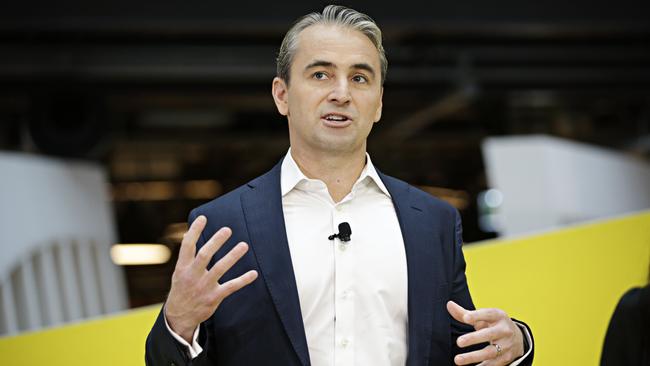
CBA, IAG and Suncorp results to name a few show the economy has bounced back and the outlook is a mile stronger than was the consensus in the middle of last year.
With the possible exception of keeping a lid on the dollar, there seems no valid reason for any RBA policy measures right now because, thanks to past efforts, its job is done.
In a note on Wednesday on the strong Westpac consumer sentiment numbers, CBA said: “It looks to us like households are focused on the bigger picture. Namely that the COVID-19 vaccination rollout is imminent and a return to pre-COVID life domestically should occur later this year. Consumers are cognisant of the incredible fiscal and monetary support that has been directed at the economic shock.”
A combination of the federal government stimulus, state and federal pandemic management and low interest rates have removed most fears evident in the middle of last year, and CBA’s Stephen Halmarick by way of example is tipping 4.2 per cent GDP growth this year, compared to negative 2.6 per cent last year and 1.9 per cent growth the prior year, with unemployment tipped to fall from a peak last year of 7.5 per cent to 5.7 per cent by year’s end.
The economy is not free of concerns and targeted support for some sectors such as airlines, education and international tourism is warranted, but business seems relaxed thinking the government will come to the party.
After a solid run, CBA’s stock price fell slightly on Wednesday to $85.91, but it was selling at 21 times forecast earnings, which is a stretch, so the result had to knock the ball out of the park to justify the rating. Still, earnings upgrades are expected.
The $1.50-a-share dividend was up on last year, but with a payout ratio of 67 per cent remains below target.
Still, one-year shareholder returns of 7 per cent, three years at 19 per cent and 10 years at 178 per cent show Comyn is delivering for shareholders.
This said, CBA is in a sweet spot, growing business lending by three times system albeit at the low margin end of the market, but Comyn has his eyes set firmly on NAB’s business franchise.
CBA already leads home lending, which it is now growing at 1.5 times system, enjoying the fact its owner-occupier and first homebuyer franchise is the dominant sector chasing property right now.
CBA has 25.2 per cent of the home loan market, against 21.6 per cent for Westpac, which tends to do better in investor and interest-only loans.
CBA’s COVID deferred loans are now down to $9bn outstanding, against a peak of $51bn, and for small businesses it is $300m, against a peak of $15.7bn.
This is another sign of an economy on the improve.
Comyn played down any concerns that the RBA was creating asset bubbles, but Jefferies analyst Brian Johnson said in a note: “The RBA settings would further inflate asset ‘bubbles’, which style-wise are good for growth over value, REITs over banks and likely weaken the Australian dollar.”
CBA’s return on equity is back into double figures at 10.5 per cent, up from 6.5 per cent last year and, with an estimated $150bn in surplus savings to offset any nerves around the end of March when JobKeeper ends, it is blue sky is all around.
CBA’s capital is $10bn above that required by APRA, which means analysts are now talking about capital management next half when the full-year result is released.
Packer helpers failed
As the Crown debacle unwinds with close James Packer aides Guy Jalland and Michael Johnston being the first to go, the irony is they were among a string of executives hired by Packer to look after his interests.
They failed dismally.
In the process, they let down their master as did a string of past executives and directors who ultimately were there for services rendered to Packer.
The governance failures were self-defeating.
Viva seen as winner
The market clearly thinks Mobil’s long expected decision to close its Altona refinery will be a boon to Viva’s Scott Wyatt given the latter’s 6 per cent price rise on Wednesday to $1.85 a share, against the 1.2 per cent increase in Ampol’s stock to $27.08.
They are now the last two refineries standing and have their operations under review.
NBN payments fall
NBN payments to Telstra and Optus will wind back from last year’s $2.4bn to about $1.1bn this year, reflecting the fact most customers have already been transferred with the network now boasting eight million customers.
Telstra will collect $1bn a year for duct rentals for the next 26 years, with an option to extend the rentals for another 20 years after 2047.
The figures are worth noting before Telstra cries poor in Thursday’s results presentation.
NBN has turned earnings before interest, tax, depreciation and amortisation positive for the first time in the latest half, at $424m.
It also repaid $3bn to the federal government reducing its debt outstanding to $16.5bn, which must be repaid by June 2024.
The feds’ equity investment in the network was $29.5bn and, now NBN is in the midst of a $4.5bn upgrade in the not too distant future, some attention will be given to monetising that stake.
In the next day or two, NBN is releasing its new pricing schedule, which will again incite complaints from its retail customers like Telstra and Optus.
Lendlease’s new boss
Tony Lombardo in May will become only the seventh CEO in Lendlease’s 63-year history, which of course includes the first 20 under founder the late Dick Dusseldorp.
The 12-year-long stint by Steve McCann has focused the company on a regeneration model built around transforming precincts into places where people want to live, be they retirement homes or urban centres.

The pipeline, which includes 22 projects with leading companies like Google, is now $110bn, which will be Lombardo’s job to execute.
The success didn’t always excite the market given COVID and other externalities, which explains why the McCann era delivered a 68 per cent underperformance against the S&P 200 index.
Lombardo will collect fixed pay of $1.8m against the $2.2m earned by McCann, with short-term bonuses up to $2.5m and long-term up to $3.2m for delivering on this task. Lombardo comes to the task after working with McCann as CFO before being transferred to Singapore to successfully run the Asian operations.
Strategically, he is closely aligned to McCann, but chair Michael Ullmer sees the big upside to come from converting the company into a digital powerhouse to revamp the development process by making best use of data.








Magic Matt Comyn delivered a very good result for CBA but, together with the early corporate returns, his numbers ask the question: just what planet is RBA boss Philip Lowe on to deliver his cautionary policies last week?